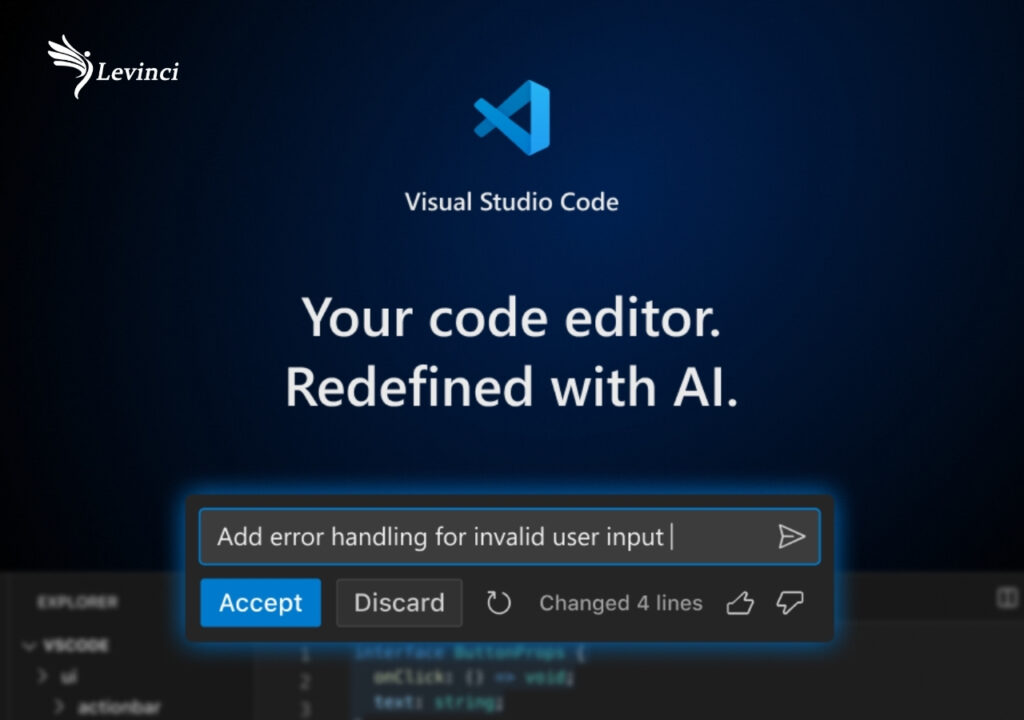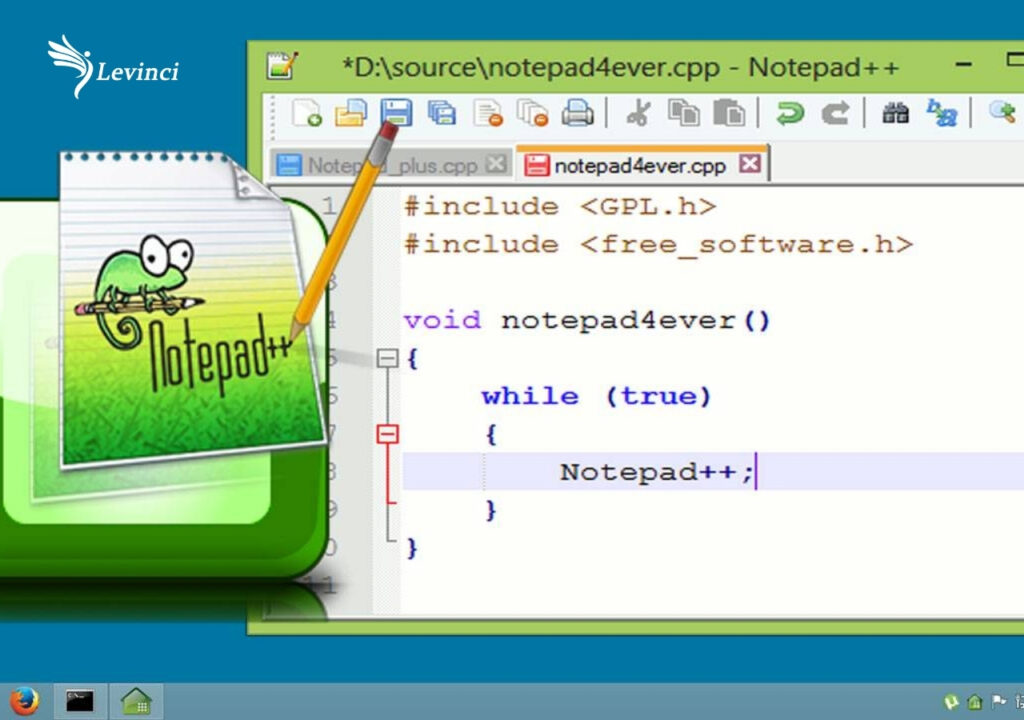Choosing the right code editor can significantly impact your productivity, code quality, and overall development experience, especially in 2025, when performance and AI integration have become essential. Whether you’re a front-end developer, backend engineer, or full-stack pro, having a fast, reliable, and feature-rich editor is non-negotiable. In this article, Levinci ranked the top 7 code editors apps for developers in 2025 based on real-world performance, speed, extensibility, and language support.
What makes a great code editor in 2025?
In 2025, the definition of a great code editor goes far beyond simple text manipulation. As the software development ecosystem continues to evolve, developers expect their tools to be faster, smarter, and more adaptable than ever before. Performance remains a top priority, developers want editors that launch instantly, respond fluidly, and handle large codebases without lag or excessive memory consumption. With more teams adopting cloud-based and remote development setups, performance is no longer just about local hardware, but also about how well the editor integrates with distributed environments.
One of the most transformative features of modern code editors is the integration of artificial intelligence. Editors in 2025 are increasingly built with AI-powered coding assistance, such as real-time code suggestions, auto-completion, and natural language-to-code generation. These features, powered by models like GitHub Copilot, Amazon CodeWhisperer, or even custom in-house solutions, dramatically enhance developer productivity. Rather than replacing the developer, AI augments decision-making, reduces repetitive tasks, and accelerates problem-solving, making it a must-have in any modern editor.
Another essential attribute is comprehensive multi-language support. Developers are no longer limited to a single stack, projects often involve a mix of front-end and back-end technologies, scripting languages, and infrastructure code. A truly great editor must offer seamless support for various programming languages, frameworks, and runtime environments. This includes features like intelligent code suggestions, debugging tools, syntax-aware linting, and integrated terminal support, all tailored to the specific language being used.

One of the most transformative features of code editors is the integration of artificial intelligence
No code editor can meet every need out-of-the-box, which is why a rich plugin ecosystem is crucial. The best editors in 2025 provide easy access to thousands of extensions that allow developers to customize their environment, integrate third-party tools, and support niche workflows without unnecessary complexity. An open and active community around these plugins ensures that the editor can grow alongside emerging technologies.
A well-designed UI/UX, intuitive keyboard shortcuts, customizable themes, and support for split views or multi-cursor editing all contribute to a smoother, distraction-free coding experience. Editors that support seamless Git integration, cloud sync, and built-in project management features are also highly valued, especially in collaborative or enterprise settings.
In short, a great code editor in 2025 is fast, intelligent, extensible, and developer-centric. It doesn’t just keep up with a developer’s workflow—it enhances it. It combines performance with power, simplicity with flexibility, and manual precision with AI-driven automation, making it an indispensable tool in the modern developer’s arsenal.
Top 7 code editors apps ranked by performance
Visual Studio Code
Often considered the industry standard, Visual Studio Code (VS Code) maintains its dominance in 2025 by continuously optimizing its Electron-based framework. While Electron applications can sometimes be resource-intensive, Microsoft has invested heavily in performance enhancements, particularly in startup times and responsiveness for large projects.
Its performance shines through its robust extension marketplace, which includes powerful AI coding assistants like GitHub Copilot, integrated debugging, and seamless Git integration, all while striving for efficient resource utilization through clever memory management and lazy loading of features. VS Code’s ability to offer a feature-rich experience without becoming overly sluggish is a testament to its ongoing development.

Visual Studio Code (VS Code) maintains its dominance by optimizing Electron-based framework
Sublime Text
Renowned for its unparalleled speed and minimalist design, Sublime Text remains a top contender for developers prioritizing raw performance in 2025. Written in C++ and Python, its core is incredibly lightweight, offering near-instantaneous startup times and incredibly low resource consumption, even when handling massive files. Its multi-cursor editing, powerful search capabilities, and highly optimized rendering engine contribute to a fluid and responsive coding experience.
While its out-of-the-box features might seem less extensive than VS Code, its highly performant plugin API allows for significant customization without compromising its fundamental speed. Sublime Text continues to be the go-to for those who value speed above all else.
Notepad++
For Windows users seeking a truly lightweight and highly performant code editor app, Notepad++ stands as an enduring champion in 2025. Built on the Scintilla editing component, it is incredibly fast, consumes minimal system resources, and launches almost instantly. Its strength lies in its simplicity and efficiency for text and code manipulation, offering features like tabbed editing, syntax highlighting for numerous languages, and powerful search-and-replace capabilities without the overhead of more complex IDEs.
While it lacks built-in AI or extensive collaboration features, its sheer speed and stability make it an invaluable tool for quick edits, log analysis, and basic coding tasks where performance is the absolute priority.

Notepad++ strength lies in its simplicity and efficiency for text and code manipulation
GNU Emacs
A legendary, highly customizable, and extremely powerful editor, GNU Emacs continues to evolve in 2025, with its performance largely dependent on how it’s configured. For those willing to invest in its steep learning curve, Emacs can be sculpted into an incredibly efficient environment.
While its initial startup can be slower than lightweight alternatives due to loading configurations and packages, once loaded, its keyboard-driven workflow, unparalleled extensibility via Emacs Lisp, and recent optimizations for graphical performance make it highly responsive for power users. Its ability to run almost any task within the editor, from email to shell commands, means less context switching, indirectly boosting overall development performance for its dedicated user base.
CodeSandbox
As a browser-based code editor app, CodeSandbox’s “performance” in 2025 is a fascinating case. While it doesn’t run locally on your machine in the traditional sense, its performance is defined by its ability to provide instant development environments, rapid spin-up times for projects, and seamless real-time collaboration.
It leverages cloud infrastructure to offload heavy computations, meaning your local machine’s performance is less of a bottleneck. For rapid prototyping, sharing, and collaborative web development, its performance in delivering a fully functional, instantly shareable environment is outstanding, though network latency can be a factor.

CodeSandbox leverages cloud infrastructure to offload heavy computations
Textastic
Targeting the iOS and iPadOS ecosystems, Textastic is a standout code editor app in 2025 for mobile development. Its performance on touch devices is exceptional, offering a fluid and responsive editing experience tailored for tablets and iPhones. It boasts fast syntax highlighting for over 80 languages, quick file opening, and robust SSH/FTP/WebDAV client integration for remote file editing.
Textastic is optimized for low resource consumption on mobile hardware, ensuring smooth operation even on older devices. Its efficiency and native feel make it an indispensable tool for developers who need to code, review, or make quick edits on the go, without compromising performance.
Acode
As a powerful and versatile code editor app designed specifically for Android devices, Acode leads the pack in mobile performance for its platform in 2025. It offers a lightweight yet feature-rich experience, excelling in opening large files quickly and providing smooth editing. With support for over 100 programming languages, integrated console access, and the ability to manage project files directly on your Android device or via FTP/SFTP, Acode delivers desktop-like performance on a mobile form factor.
Its active development focuses on maintaining speed and responsiveness even as new features and plugins are introduced, making it an excellent choice for Android developers prioritizing on-the-go efficiency.

Acode leads the pack in mobile performance for its platform in 2025
These seven code editor apps represent the pinnacle of performance in 2025, each excelling in different aspects and for various developer needs. Your choice will ultimately depend on your primary platform, workflow, and specific demands for speed and efficiency.
How to choose the right editor apps for you
Selecting the right code editor app is a highly personal decision that depends on your unique development needs, workflow, and preferences. With so many powerful editors available in 2025, each offering different combinations of speed, features, and platform compatibility, understanding what matters most to you is key. Performance should be a primary consideration, choose an editor that launches quickly and stays responsive, especially if you work with large projects or frequently switch between files.
However, speed alone isn’t enough; you should also evaluate how well the editor supports the programming languages and frameworks you use regularly, along with the availability of extensions or plugins that can tailor the environment to your specific tasks.
Another important factor is the development environment itself. If you work primarily on a desktop, a full-featured editor like Visual Studio Code or Sublime Text might be ideal, whereas mobile or tablet developers may prefer lightweight, optimized apps like Textastic or Acode. Integration with version control systems such as Git, built-in debugging tools, and collaboration features can also influence your choice, especially if you work in a team or handle complex projects.
Finally, consider the learning curve and customization options—some editors, like GNU Emacs, offer unmatched flexibility but require more time to master, while others provide intuitive interfaces that let you start coding immediately.
Conclusion
In 2025, the landscape of code editors continues to evolve, driven by performance demands, AI integration, and developer preferences across diverse stacks. Whether you prioritize speed, extensibility, cross-platform support, or deep language integration, there’s a code editor on this list that fits your needs. Ultimately, the best editor is the one that complements your development style and boosts your productivity. Tried one of these editors or have a favorite not listed? Let us know in the comments and stay tuned for more hands-on reviews and dev tool insights.

